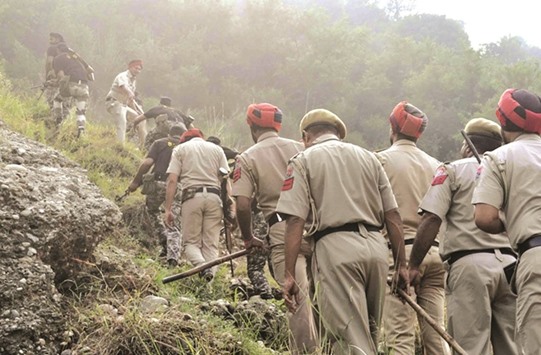The Congress Party yesterday urged India not to boycott the Saarc summit, adding it should be held without Pakistan.
The party’s reaction came after Afghanistan, Bangladesh and Bhutan decided to join India in boycotting the annual summit of the South Asian Association of Regional Co-operation scheduled to be hosted by Islamabad in November.
India has sought to isolate Pakistan in the wake of the raid on an army base in Uri in Jammu and Kashmir, which killed 18 soldiers and triggered public fury.
On Tuesday, the government said Prime Minister Narendra Modi would not attend the summit, in a major snub to Pakistan.
Without naming Pakistan, the external affairs ministry said “increasing cross-border terrorist attacks in the region and growing interference in the internal affairs of member states by one country” had created an environment that was not conducive for a meeting.
Hours later, Bangladesh said it was also pulling out.
Afghanistan and Bhutan – both close India allies – have since followed suit.
But the opposition Congress said the summit must go ahead but without Pakistan.
“The government has still not come up with a concrete policy as to how to respond to the Uri attack. After the Uri attack, they said ‘for one tooth, the response will be complete jaw’. But today, they are saying they’ll boycott the Saarc Summit,” said Congress spokesman Manish Tewari.
“There are many challenges in South Asia. This is the world’s least integrated region. Shouldn’t the government think over it that instead of boycotting the Saarc Summit, it would be better to have the summit without Pakistan. Pakistan should be isolated globally,” he added.
Tewari said: “Boycott is the easiest answer, but Saarc as an institutional mechanism serves another purpose. India is one of the founder members and the movers of Saarc. Isn’t it incumbent upon India to explore a situation whereby Saarc can be kept alive, but Pakistan is isolated.”
The Congress also questioned the government’s review of the Indus Waters Treaty.
Tewari said: “For the past three days we have been hearing that the government is reviewing the Indus Waters Treaty. What does this mean? Is the government going to cancel the treaty? Or is the government thinking about building dams on the western rivers?
“Even if it is thinking on those lines, dams can’t be built overnight. This can be a long-term solution, but the kind of response the nation is demanding, is this of the same kind?,” he asked.
“Will the deep state of Pakistan get influenced by this strategy,” Tewari said.
Talking about the larger geo-strategic reality, Tewari said: “We are extremely happy that Afghanistan, Bangladesh and Bhutan are on the same page with India.
But, there is larger geo-strategic reality. Something more is required to be done to change the behaviour of deep state of Pakistan.”
Tewari also took a dig at Russia, China and the US for their policy on dealing with Pakistan.
“Russia is conducting joint exercises with Pakistani army. China invested in the China-Pakistan Economic Corridor (CPEC). Iran is talking about the linkage between Chabahar and Gwadar ports and wants to join the CPEC.
“The US has always had one standard towards terror on the western border of Pakistan and a completely different standard on the eastern border,” said Tewari.
“This is also a geo-strategic reality and we are talking about great powers who can change and influence the behaviour of Pakistan. If we are really serious about isolating Pakistan, delusion cannot be the basis of the policy. Under these circumstances, the government needs to take a hard look,” he added.
Pakistan denies any involvement in the September 18 Uri attack, the worst of its kind in over a decade.
But India’s army has blamed Jaish-e-Mohamed, a Pakistan-based militant group that was also implicated in an audacious assault on an Indian Air Force base Pathankot in January.

Punjab and Himachal Pradesh police carry out combing operations following reports that some local residents had spotted two-three u201csuspicious menu201d in army fatigues in Pathankot, Punjab, yesterday. Security forces have been alert after militants carried out an audacious assault on an Indian Air Force base Pathankot in January which killed seven soldiers.
